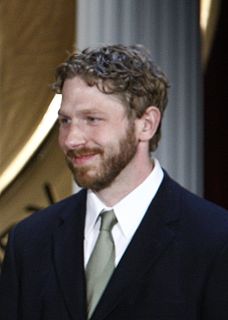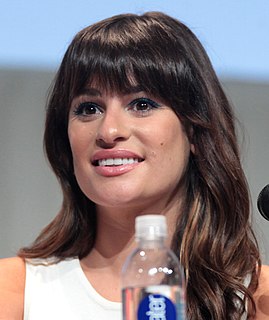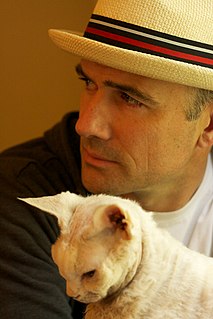A Quote by Christian Cooke
Ultimately, if the character is interesting and you said that before: It doesn't matter if it's likable. That's really what it is. If they interest you. If the context in which the characters are set interests you then I think then you're pulled in by it.
Related Quotes
Some of the things I love the most are when a writer or a visionary takes on sort of an iconic character and then spins it. Like with Frank Miller, Batman was this one thing for basically forty years, and then Frank Miller came along and said he can also be this other thing. And Christopher Nolan came along and said he can also be this other thing. The idea of taking iconic comic book characters or superhero characters or mythic characters and subverting the genre or coming up with a new idea is something that's really interesting to me.
One of the stories I love is how Gutenberg’s printing press set off this interesting chain reaction, where all of a sudden people across Europe noticed for the first time that they were farsighted, and needed spectacles to read books (which they hadn’t really noticed before books became part of everyday life); which THEN created a market for lens makers, which then created pools of expertise in crafting lenses, which then led people to tinker with those lenses and invent the telescope and microscope, which then revolutionized science in countless ways.
Ultimately, any character you write - no matter how fantastic or alien - is an extension of yourself. When our characters reflect the truth of our souls and psyches, they become real and compelling. The wonderful paradox is that the characters then take on lives of their own, separate from their creators. That's where the magic comes in.
The future of ballet is really in the hands of the creators, so if it's something that interests them to push the envelope with gender roles, then I think it will change. But if that's not of interest to a dance-maker, if their interest is to sort of preserve the way things have been done for the past 200 years, then nothing is going to change.
What interests Sam Mendes are characters and relationships, and he was a genius at giving you the freedom to create the type of character you want, and also to explore and have fun with your fellow actors. For him, characters and relationships are really the heartbeat of the film, and then the action is the backdrop. By developing the characters, he makes you care that much more about the action and going on a journey with the characters.
I think at some level, it's just alchemy that we, as writers, can't explain when we write the characters. I don't set out to create the characters - they're not, to me, collections of quirks that I can put together. I discover the characters, instead. I usually go through a standard set of interview questions with the character in the beginning and ask the vital stuff: What's important to you? What do you love? Hate? Fear? .. and then I know where to start. But the characters just grow on their own, at a certain point. And start surprising me.
It wasn't exactly a cattle call. I had an agent, and they were seeing people for the parts, so my agent said, "Here's the script, see if there's anything that speaks to you." And I did, and I called my agent and said, "I think this character Data is kind of interesting," and she said, "Well, okay, I'll get you the appointment with Junie Lowry." I had to read with the casting agent first, 'cause nobody really knew me then. Then after that, I had, I think, six different auditions for the role. And finally it was me [on Star Trek].
If you do a black character or a female character or an Asian character, then they aren't just that character. They represent that race or that sex, and they can't be interesting because everything they do has to represent an entire block of people. You know, Superman isn't all white people and neither is Lex Luthor. We knew we had to present a range of characters within each ethnic group, which means that we couldn't do just one book. We had to do a series of books and we had to present a view of the world that's wider than the world we've seen before.
I always set out to tell a good story, to create a character that young people can relate to, place them in a situation that will be interesting, intriguing, eventually suspenseful. But what I find is that after I do that, then there are themes that emerge, which teachers can then use to provoke discussion and debate.
The Persians are very fond of wine ... It is also their general practice to deliberate upon affairs of weight when they are drunk; and then in the morning, when they are sober, the decision to which they came the night before is put before them by the master of the house in which it was made; and if it is then approved they act on it; if not, they set it aside. Sometimes, however, they are sober at their first deliberations, but in this case they always reconsider the matter under the influence of wine.
What I do is give Ennio Morricone suggestions and describe to him my characters, and then, quite often, he'll possibly write five themes for one character. And five themes for another. And then I'll take one piece of one of them and put it with a piece of another one for that character or take another theme from another character and move it into this character.... And when I have my characters finally dressed, then he composes.
I think character is very much a product of where you live, who you are, what is happening in that time of your life, and I'm interested in those pressures, those forces. A political context, a social context, really determines if not who people are then how they treat one another and what they say, how they speak.




































